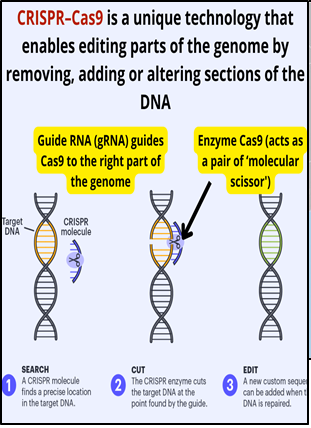BREAKTHROUGH GENE-EDITOR BY INDIAN SCIENTISTS
Why in the news?
Indian scientists develop a precise CRISPR system using FnCas9, showing improved genome editing and potential for affordable therapeutics.
 source:medium
source:medium
About Enhanced CRISPR System with FnCas9:
- CSIR-IGIB and L.V. Prasad Eye Institute developed a precise genome-editing system using FnCas9 enzyme.
- FnCas9 edits genomes more efficiently with fewer off-target effects compared to SpCas9.
- Modified FnCas9 shows higher binding affinity to PAM sequence and greater flexibility for hard-to-access genome regions.
What is Genome and Genome Sequencing?
- Genome: Complete set of an organism’s DNA, including all genes; human genome has over 3 billion base pairs.
- Genome Sequencing: Determines DNA nucleotide order (Adenine, Cytosine, Guanine, Thymine).
- Applications: Advances in medical science, disease management, precision medicine.
- Importance: Understanding genome function and non-gene regions.
What is Genome Editing?
- Definition: Genome editing alters an organism’s DNA, adding, removing, or altering genetic material at specific genome locations.
- CRISPR System: Advanced, precise tool for targeted genome interventions.
Categories:
- SDN 1: Small insertions/deletions, no foreign DNA.
- SDN 2: Specific changes using DNA template, no foreign DNA.
- SDN 3: Involves foreign DNA, similar to GMO development.
About Clustered Regularly Interspaced Short Palindromic Repeats:
- CRISPR : Gene-editing technology that alters DNA sequences by cutting, adding, or removing genetic material.
- Development: Adapted from bacterial immune systems that cut viral DNA.
- Components: Cas9 enzyme (molecular scissors) and guide RNA (directs Cas9 to DNA).
- Applications: Potential to treat genetic conditions like cancer, hepatitis B, and high cholesterol.
|
source:medium




